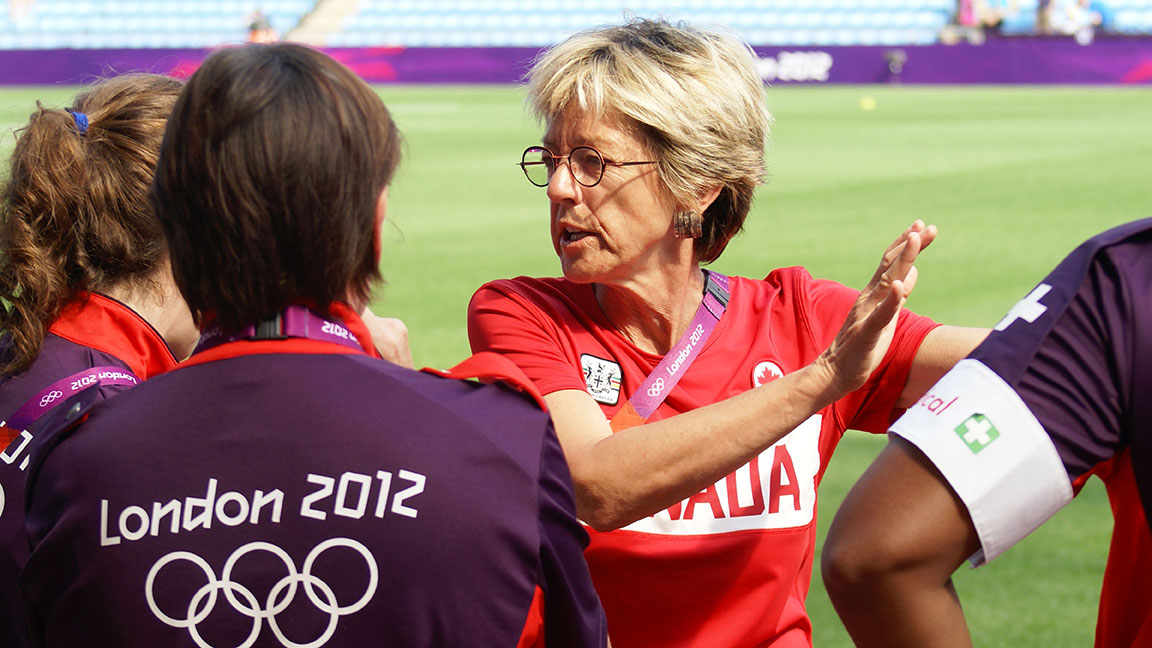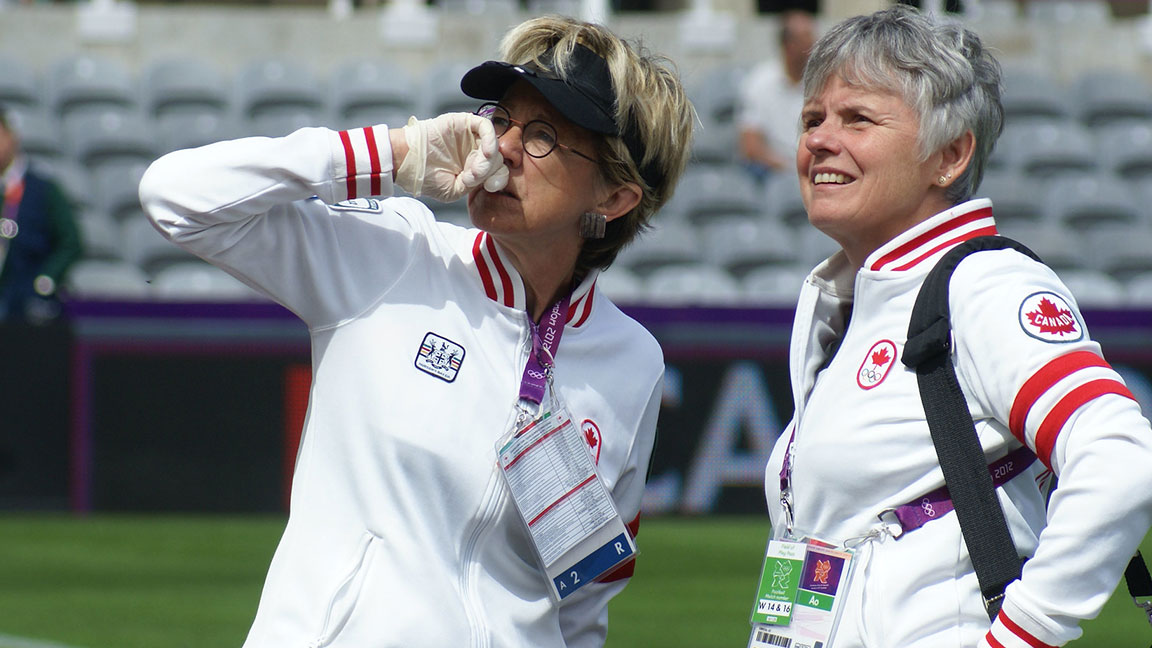
FIFA
Story by Richard Scott
We were all on the edge of our seats in 2012, that historic Olympic Semifinals match at Manchester’s Old Trafford during the London 2012 Olympic Games. Dr. Cathy Campbell was right there on the edge of her seat too, but unlike most of the world that was caught up in the back-and-forth action to one of the most thrilling matches in Olympic history, she was focused solely on the health and safety of Canada’s 11 players on the pitch.
“I could feel my heart thumping, but I was there to take care of the players,” remembers Campbell. “It is so easy to get tied into the craziness, but that wasn’t my job. I was there to take care of the players and so I just had to be ready.”
Ready she was from Canada’s team bench, most memorably in that one moment when her and physiotherapist Judy Russell were rushed on to the pitch to care for superstar Desiree Scott who had been crunched by an American in a tackle. Scott remarkably didn’t miss a minute of the competition in 2012, including the Bronze Medal match three days later when Canada captured their first medal in a traditional team sport at the Summer Olympic Games since 1936.
Today, Campbell serves as a Sport Medicine Physician and Executive Health Physician at Cleveland Clinic Canada in Toronto. While it has been 11 years since she stepped away from Canada Soccer’s National Teams, she continues to be involved as a Medical Officer and Doping Control Officer at FIFA events. This past summer, she served as a Doping Control Officer at the FIFA Women’s World Cup Australia & New Zealand 2023, her seventh major global soccer tournament including six FIFA World Cups and the London 2012 Olympic Games.
“Every tournament is different and each one has its challenges,” said Campbell after this summer’s big event. “As a team doctor, I was collegial to all the teams and team doctors because they are your peers and you know you may need them at some point. As doctors, we are there to take care of the athletes and to take care of people.”
Campbell uses a similar approach as a FIFA Medical Officer or FIFA Doping Control Officer, ensuring that she gets to know the local doctors in the different countries she has worked as well as the team doctors at the venues she has been assigned. Along with her Canada Soccer and FIFA assignments to seven major tournaments, she has also worked at 10 FIFA youth tournaments, four Concacaf confederation tournaments, one Pan American Games, and two Concacaf youth tournaments.
“I think FIFA likes to send me places because I’m a friendly Maritimer and that goes a long way in getting along with people,” said Campbell. “I generally can get along with anyone.”
Her football résumé already spans 24 years while her assignments go across all six confederations around the world. With the Women’s National Team, she worked with Head Coach Even Pellerud from 2000 to 2007 and then with John Herdman from 2011 to 2012. She was part of the Canada squad that finished fourth at the 2003 FIFA World Cup, won a Gold Medal at the 2011 Pan American Games, and won an Olympic Bronze Medal at London 2012.

With Canada Soccer’s Local Organising Committee, she was the Chief Medical Officer for the FIFA U-20 Women’s World Cup Canada 2014 and the record-setting FIFA Women’s World Cup Canada 2015. With Canada Soccer’s youth teams, she worked alongside U-19 Coach Ian Bridge when Canada won a FIFA Silver Medal at the inaugural FIFA U-19 Women’s World Championship at Edmonton in 2002 and then won Canada’s first Concacaf women’s youth title at the Concacaf Women’s Under-19 Championship at Ottawa in 2004.
From more than a decade at Canada Soccer, she stands alongside some of Canada’s most experienced team doctors with the National Teams, some of the most notable of which include doctors Thomas Fried, Rudy Gittens, Ed Johnson, John Philpott and Andrew Pipe as well as current team doctors Lee Schofield and Dave Simon. With over two decades in the sport, it is also no surprise that she remains one of the most respected medical leaders in football.
“We’re generally quite friendly and we tend to be humble, but as Canadians we are respectful and very knowledgeable,” said Campbell. “We are well trained, we have excellent universities and excellent experiences, so for those reasons we are well respected in our field.”
When it comes to athlete care in football, Campbell notes that there have been plenty of advancements in her time, be it the implementation of hydration breaks, the time allowance to assess potential concussions, and the use of new technology and video to assess potential injuries.
While plenty has changed for the better since the start of the century, she is understandably disappointed by the frequency and severity of ACL injuries (anterior cruciate ligament) in women’s footballers in recent years. She was the lead author for an ACL paper in 2014 which was selected as a Position Paper for the Canadian Academy of Sport and Exercise Medicine (CASEM), but while they have their theories, she notes that we still don’t know exactly why women have been at a greater risk.
Campbell, who served as President of CASEM from 2021-22, continues to look forward, but she still keeps those Canadian team experiences near to her heart, with a couple of her biggest matches the Canada-Brazil 2002 Semifinals at the FIFA U-19 Women’s World Championship and the Canada-USA Semifinals at the London 2012 Olympic Games.
“For that Olympic Bronze Medal, we all worked so hard and we can really be proud of our preparations from the moment we qualified because when we got there, we had done everything that we could for the athletes,” said Campbell. “Just to get that first Olympic Bronze Medal, it felt like we all raised the bar, from John’s training to the care of the athletes.”